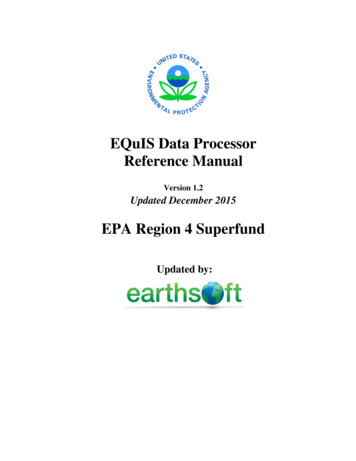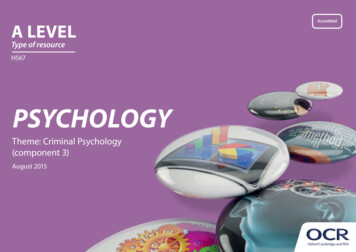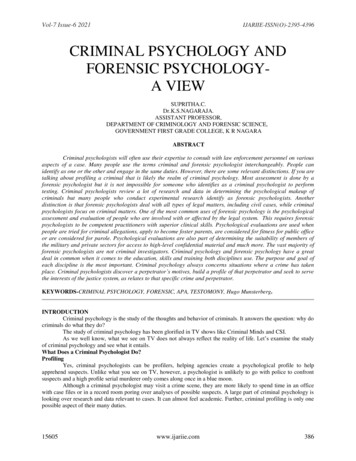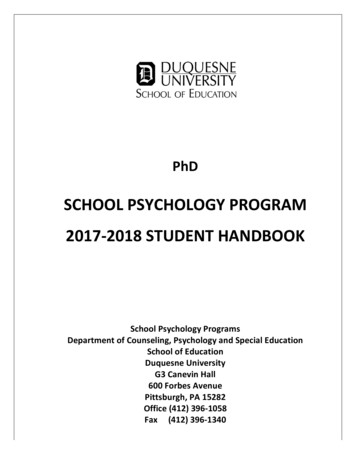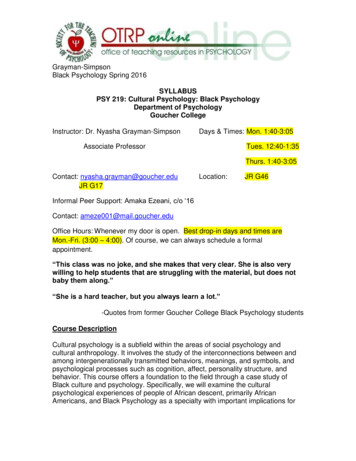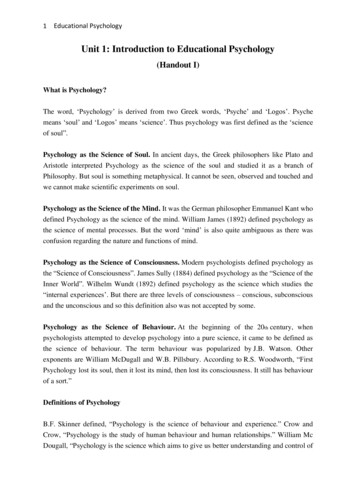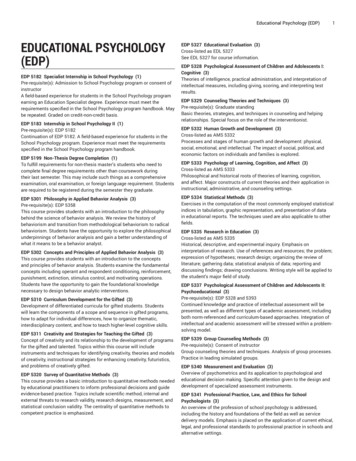
Transcription
Educational Psychology (EDP)EDUCATIONAL PSYCHOLOGY(EDP)EDP 5182 Specialist Internship in School Psychology (1)Pre-requisite(s): Admission to School Psychology program or consent ofinstructorA field-based experience for students in the School Psychology programearning an Education Specialist degree. Experience must meet therequirements specified in the School Psychology program handbook. Maybe repeated. Graded on credit-non-credit basis.EDP 5183 Internship in School Psychology II (1)Pre-requisite(s): EDP 5182Continuation of EDP 5182. A field-based experience for students in theSchool Psychology program. Experience must meet the requirementsspecified in the School Psychology program handbook.EDP 5199 Non-Thesis Degree Completion (1)To fulfill requirements for non-thesis master's students who need tocomplete final degree requirements other than coursework duringtheir last semester. This may include such things as a comprehensiveexamination, oral examination, or foreign language requirement. Studentsare required to be registered during the semester they graduate.EDP 5301 Philosophy in Applied Behavior Analysis (3)Pre-requisite(s): EDP 5358This course provides students with an introduction to the philosophybehind the science of behavior analysis. We review the history ofbehaviorism and transition from methodological behaviorism to radicalbehaviorism. Students have the opportunity to explore the philosophicalunderpinnings of behavior analysis and gain a better understanding ofwhat it means to be a behavior analyst.EDP 5302 Concepts and Principles of Applied Behavior Analysis (3)This course provides students with an introduction to the conceptsand principles of behavior analysis. Students examine the fundamentalconcepts including operant and respondent conditioning, reinforcement,punishment, extinction, stimulus control, and motivating operations.Students have the opportunity to gain the foundational knowledgenecessary to design behavior analytic interventions.EDP 5310 Curriculum Development for the Gifted (3)Development of differentiated curricula for gifted students. Studentswill learn the components of a scope and sequence in gifted programs,how to adapt for individual differences, how to organize thematic,interdisciplinary content, and how to teach higher-level cognitive skills.EDP 5311 Creativity and Strategies for Teaching the Gifted (3)Concept of creativity and its relationship to the development of programsfor the gifted and talented. Topics within this course will includeinstruments and techniques for identifying creativity, theories and modelsof creativity, instructional strategies for enhancing creativity, futuristics,and problems of creatively gifted.EDP 5320 Survey of Quantitative Methods (3)This course provides a basic introduction to quantitative methods neededby educational practitioners to inform professional decisions and guideevidence-based practice. Topics include scientific method, internal andexternal threats to research validity, research designs, measurement, andstatistical conclusion validity. The centrality of quantitative methods tocompetent practice is emphasized.1EDP 5327 Educational Evaluation (3)Cross-listed as EDL 5327See EDL 5327 for course information.EDP 5328 Psychological Assessment of Children and Adolescents I:Cognitive (3)Theories of intelligence, practical administration, and interpretation ofintellectual measures, including giving, scoring, and interpreting testresults.EDP 5329 Counseling Theories and Techniques (3)Pre-requisite(s): Graduate standingBasic theories, strategies, and techniques in counseling and helpingrelationships. Special focus on the role of the interventionist.EDP 5332 Human Growth and Development (3)Cross-listed as AMS 5332Processes and stages of human growth and development: physical,social, emotional, and intellectual. The impact of social, political, andeconomic factors on individuals and families is explored.EDP 5333 Psychology of Learning, Cognition, and Affect (3)Cross-listed as AMS 5333Philosophical and historical roots of theories of learning, cognition,and affect. Major constructs of current theories and their application ininstructional, administrative, and counseling settings.EDP 5334 Statistical Methods (3)Exercises in the computation of the most commonly employed statisticalindices in tabulation, graphic representation, and presentation of datain educational reports. The techniques used are also applicable to otherfields.EDP 5335 Research in Education (3)Cross-listed as AMS 5335Historical, descriptive, and experimental inquiry. Emphasis oninterpretation of research. Use of references and resources; the problem;expression of hypotheses; research design; organizing the review ofliterature; gathering data; statistical analysis of data; reporting anddiscussing findings; drawing conclusions. Writing style will be applied tothe student's major field of study.EDP 5337 Psychological Assessment of Children and Adolescents II:Psychoeducational (3)Pre-requisite(s): EDP 5328 and 5393Continued knowledge and practice of intellectual assessment will bepresented, as well as different types of academic assessment, includingboth norm-referenced and curriculum-based approaches. Integration ofintellectual and academic assessment will be stressed within a problemsolving model.EDP 5339 Group Counseling Methods (3)Pre-requisite(s): Consent of instructorGroup counseling theories and techniques. Analysis of group processes.Practice in leading simulated groups.EDP 5340 Measurement and Evaluation (3)Overview of psychometrics and its application to psychological andeducational decision making. Specific attention given to the design anddevelopment of specialized assessment instruments.EDP 5341 Professional Practice, Law, and Ethics for SchoolPsychologists (3)An overview of the profession of school psychology is addressed,including the history and foundations of the field as well as servicedelivery models. Emphasis is placed on the application of current ethical,legal, and professional standards to professional practice in schools andalternative settings.
2Educational Psychology (EDP)EDP 5344 Individual Brief/Crisis Counseling (3)Overview of current methods of brief therapy and simulated experiencesusing brief therapy. Identification of situations having the potential forcrisis, description of clients in crisis, consideration of theories devoted toexplanation and possible amelioration of crises. Practice in counselingclients using brief therapy or crises interventions. Visits to appropriatesettings.EDP 5346 Therapeutic Intervention (3)Pre-requisite(s): EDP 5356Provides an extended understanding of the philosophy and methodologyof applied behavior analysis. Applied behavior analysis is an extremelywell developed approach to solving problems in educational settings, andprovides one of the best examples of a consistent model for being anaccountable, scientifically-oriented practitioner. In this course, studentslearn to implement assessment and intervention techniques based on thescience and theory of behavior analysis.EDP 5351 Social/Emotional Needs of the Gifted (3)Differential affective characteristics of gifted students; generalcounseling theories; communicating with the gifted; assessing affectiveneeds; helping the gifted develop social and interpersonal skills; thedefining role of the school in affective development; and measuring thepotential of the gifted to achieve and contribute to society and the lives ofothers.EDP 5352 Counseling in Religious Settings (3)Pre-requisite(s): EDP 5329 or consent of instructorIntegration of principles of religious faith with various counselingproblems and psychotherapeutic systems. The course includes subjectareas such as ethics, the identity of the counselor, and an evaluation ofselected psychological theories for their usefulness in a religious settingand/or from a religious perspective.EDP 5353 Spirituality and Religion in Counseling (3)This course is designed to help students increase their awarenessand knowledge of diverse spiritual and religious traditions, the role ofspirituality and religion to human development and mental health, andassessment and treatment approaches to counseling clients' spiritualand religious concerns.EDP 5354 Ethics in Applied Behavior Analysis (3)The course provides information on the profession of behavior analysis,including the history, foundations, and ethical principles. The courseemphasizes the ethical principles and professional expectations withinthe field of applied behavior analysis. This includes a detailed reviewof the Behavior Analysis Certification Board Professional and EthicalCompliance Code for Behavior Analysts.EDP 5356 Psychological Interventions with Children and Adolescents I:Behavior (3)An overview of behavior management, including different beliefs as towhy behavior occurs. The process of collecting data for the purpose ofassessing individual and group behavior and making decisions about theeducation of children will be studied.EDP 5357 Single-Subject Research Design (3)An initial course in the use of single-subject research methodology.Single-subject research designs are empirical designs rooted in thefield of applied behavior analysis that are regularly used in the study ofindividuals with low incidence disabilities, but are also appropriate forother populations. This class examines the characteristics of singlesubject research designs.EDP 5358 Teaching Individuals with Autism and DevelopmentalDisabilities (3)Covers specific teaching techniques utilized among individuals withdevelopmental disabilities. Data collection techniques used to monitorprogress will be introduced, as well as preference assessment(s) andcommunication intervention(s).EDP 5360 Psychological Interventions with Children and Adolescents II:Counseling (3)An overview of developmentally appropriate evidence-based approachesto counseling children and adolescents in school and mental healthsettings. Addresses foundational techniques, assessment of treatmentprogress, working with parents and teachers, and ethical/legalconsiderations.EDP 5361 Challenging Behavior and Developmental Disabilities (3)Pre-requisite(s): EDP 5346 5356Provides a general understanding of severe challenging behaviors,such as self-injury and aggression, including various reasons thatindividuals with disabilities develop and maintain such behaviors, as wellas assessment and treatment methods to address them.EDP 5362 Psychological Interventions with Children and Adolescents III:Academic (3)An overview of evidence-based approaches to intervening with childrenand adolescents who have academic difficulties. Addresses foundationalaspects of teaching and learning, assessment of interventioneffectiveness, and ethical and legal considerations.EDP 5363 Teaching Associate Special Education (3)Pre-requisite(s): EDP 5332Clinical teaching experience in a local school where teacher candidatesinteract with special education students. Includes completion of contentmodules, conferencing with clinical instructor and university instructor,observation of lessons taught by master teachers, written lessonreflections, and preparation of and evaluation of benchmarks.EDP 5364 Psychological Interventions with Children and Adolescents IV:Cognitive Behavioral Therapy (3)This course involves in-depth study of basic cognitive behavioralprocedures and research specific to the treatment of a number of clinicalproblems of children and adolescents. This class consists of five units:1) overview of cognitive behavioral therapy (CBT); 2) critical issues forthe field; 3) special applications of CBT; 4) internalizing disorders andproblems; and 5) externalizing disorders and problems.EDP 5366 Psychology of Exceptional Children (3)Problems of the exceptional child in a developmental framework.Differences in intellectual functioning, academic achievement, and socialrelationships will be explored. A social psychological perspective will alsobe presented, i.e., the degree to which society accepts the exceptionaland what effect this has upon their development.EDP 5367 Developmental Psychopathology (3)Overview of behavioral and emotional disorders of childhood,adolescence, and emerging adulthood from a developmental perspective.This course focuses on the description, assessment, epidemiology,etiology, and evidence-based treatment of each disorder.EDP 5368 Methods for Teaching the Emotionally Disturbed (3)Pre-requisite(s): EDP 5366Techniques for the education of emotionally disturbed children andadolescents. Emphasis is placed on understanding classroom behavior,developing teacher-student relationships, and structuring classroomlearning.
Educational Psychology (EDP)EDP 5369 Methods and Media for Children with LearningDisabilities (3)Pre-requisite(s): EDP 5366Individual diagnosis of learning disabilities. Experiences will be providedin preparing individual educational plans and materials, both fromdevelopmental and remedial approaches.EDP 5370 Consultation, Collaboration, and Family-SchoolPartnerships (3)Knowledge of and skills for consulting with parents and teachers;collaborating with teachers, school administrators, and otherprofessionals; and building family-school partnerships. Techniques areprovided for gathering information regarding the needs of exceptionalchildren and for involving teachers, parents, and others in better meetingthese needs.EDP 5374 Managing Behavior Change Programs (3)This course teaches students to apply the principles of applied behavioranalysis to develop goals and interventions based on integratedinformation, utilize a data-based decision-making model to evaluateefficacy of programs, and learn effective supervision techniques.Students learn skills needed to analyze cases and develop appropriatebehavior change programs for clients' maximum desired performance.EDP 5376 Practicum with Exceptional Children (3)All courses in the certification program. Field experiences with varioustypes of exceptional children.EDP 5390 Seminar: Education (3)Designed to meet individual needs of graduate students. May berepeated.EDP 5391 Cultural Issues in Higher Education (3)Cross-listed as EDA 5391, EDL 5395This course explores topics relevant to providing educational services todiverse student populations in higher education. Students will developknowledge, attitudes, and skills needed to function within their ownmicroculture, the United States macroculture, other microcultures, andthe global community. Students will develop skills and understandingof effective strategies for academic assessment and intervention, andstrategies to facilitate student success in higher education.EDP 5393 Cultural Issues with Children and Families (3)An overview of the psychosocial and educational needs of ethnicallyand linguistically diverse children is discussed, including the impact ofculture, cross-cultural assessment, and treatment models in a multisystems approach.EDP 5394 Psychological Assessment of Children and Adolescents III:Social-Emotional (3)Pre-requisite(s): EDP 5337An overview of social-emotional, behavior, and personality assessmenttechniques. Primary focus is on administering, scoring, and interpretingdata from instruments for children and adolescents.EDP 5662 Internship Special Education (6)Pre-requisite(s): EDP 5332Full time teaching experience where teacher candidates interact withspecial education students. Includes completion of content modules,conferencing with mentor teacher and university instructor, observationof lessons taught by master teachers, written lesson reflections, andpreparation of benchmark evaluations.3EDP 5V54 Practicum with Gifted Students (3-6)Three to six semester hours of practicum experience or two years ofsuccessful classroom teaching experience in an approved program forgifted and talented students to meet the requirement for an endorsementin this area. Regular consultation with program faculty to developteaching skills is arranged in conjunction with the setting, May berepeated for credit.EDP 5V78 Practicum in School Psychology (1-3)Pre-requisite(s): Admission to School Psychology program or consent ofinstructorSupervised practicum in School Psychology. May be repeated. Graded oncredit/no-credit basisEDP 5V95 Special Problems in Education (1-4)Designed to meet individual needs of graduate students. May berepeated.EDP 5V98 Practicum in Applied Behavior Analysis (1-3)A supervised practicum in applied behavior analysis. Throughout thepracticum experience, students receive regular consultation with programfaculty and instructors to develop applied assessment and interventionsskills within the field experience. This course may be repeated for credit.EDP 5V99 Thesis (1-6)Credit received when the thesis is finally approved.EDP 6155 Reflection of Multidisciplinary Studies (1)Pre-requisite(s): EDP 6154Research resulting from the examination of contemporary issues,problems, and/or themes from a multidisciplinary perspective will beshared in a symposium.EDP 6156 Doctoral Seminar, Part 3 (1)Pre-requisite(s): Completion of EDP 6354 and EDP 6255In this course, students will develop ongoing plans for research, teaching,and service as they prepare for graduation. Students will learn how todevelop a line of research to continue building on the framework ofresearch initiated during the Ph.D. program. Additionally, students willlearn how to identify and interpret academic job postings and preparesuccessful application documents.EDP 6157 Doctoral Seminar, Part 3 (1)Pre-requisite(s): Completion of EDP 6302 and EDP 6201In this course students develop ongoing plans for research, teaching, andservice as they prepare for graduation. Students learn how to developa line of research to continue building on the framework of researchinitiated during the Ph.D. program. Additionally, students learn how toidentify and interpret academic job postings and prepare successfulapplication documents.EDP 6182 Doctoral Internship in School Psychology (1)Pre-requisite(s): Admission to school psychology program or consent ofinstructorA field-based experience for doctoral students in school psychology.Experience must meet the requirements specified in the schoolpsychology internship handbook. May be repeated. Graded on credit-noncredit basis.EDP 6201 Doctoral Seminar Part 2 (2)Pre-requisite(s): EDP 6302, Doctoral Seminar 1This course provides students with skills necessary for dissemination inresearch. Students learn the skills associated with participating in peerreview, present research, and publish research.
4Educational Psychology (EDP)EDP 6302 Doctoral Seminar Part 1 (3)This course provides students with the skills necessary to begin asuccessful doctoral experience. This course introduces methods forsystematically identifying existing literature, developing researchquestions, and producing meaningful lines of research.EDP 6320 Concepts and Foundations of Behavioral Assessment (3)This course introduces students to the fundamentals of measurementand evaluation in applied behavior analysis (ABA). Students learn thehistory of behavioral assessment as well as traditional concepts (e.g.,reliability, validity) related to assessment development and research.Students also learn to critique and analyze measurement-relatedresearch for commonly used assessments in behavior analysis.EDP 6325 Positive Behavior Interventions and Supports (3)This course prepares students to work effectively within a positivebehavior interventions and supports framework. Positive behaviorinterventions and supports is a school-wide approach to managingbehavior that targets teaching and reinforcing desired, positive behavioramong children in a classroom.EDP 6330 Seminar in Learning and Development Issues (3)Pre-requisite(s): Doctoral standingThis seminar examines current issues in educational psychologyfrom a historical and research perspective. Readings will focus on theapplication of psychological concepts to the educational process.EDP 6332 Advanced Human Growth and Development (3)Pre-requisite(s): EDP 5332This course is an advanced study of human development from birththrough adolescence. The relationships between the individual, thefamily, and society are explored within the context of social justice, as arethe ways that these relationships vary within and across cultures. Keyresearch studies are examined.EDP 6333 Advanced Study of Human Learning (3)Pre-requisite(s): EDP 5333, 5334, and 5335Individualized, directed study of topics in human learning. Topics includeattention and perceptual learning, language acquisition, memory, andsocial learning. Students choose a research problem in human learning,do a review of the literature, and conduct a pilot study to investigate theproblem.EDP 6335 Research Practicum in Education (3)Cross-listed as EDA 6335, EDL 6335Pre-requisite(s): EDP 5335Educational research writing. Emphasis will be placed on the organizationof the prospectus, the thesis, the dissertation, and the abstract whichare typically required by graduate schools in professional fields.Individualized and critical assistance will be given in the research writingstyle and composition mechanics befitting the research design chosen.EDP 6336 Qualitative Research and Data Analysis (3)Cross-listed as EDC 6336Pre-requisite(s): EDP 5335 or EdD online studentThe development of an in-depth understanding of the major methods ofinquiry associated with qualitative research will be emphasized. Theseinclude participant observation, interviewing, and document analysis.Additionally, an appreciation for the strengths and limitations of engagingin qualitative research and a general understanding of the paradigmsthat undergird qualitative research and their implications for conductingqualitative inquiry will be cultivated.EDP 6337 Psychometric Theory and Test Construction (3)Pre-requisite(s): EDP 5340Review of the theoretical literature and construction of direct andindirect performance tests. Course will cover cognitive, affective, andpsychomotor domains, theoretical assumptions underlying test design,criteria for the appropriate construction of discreet item forms, processesused to establish test validity and reliability, and use of test constructionsoftware.EDP 6338 Grant Writing (3)Cross-listed as EDC 6338Information about sources of external funding and instruction in thetechniques of grant writing.EDP 6339 Ethnographic Research Methods in Education (3)Cross-listed as EDC 6339See EDC 6339 for course information.EDP 6340 Teaching in Higher Education (3)Campus-based experiences in a higher education setting. Particularattention will be given to the design of courses of study and instructionalstrategies that encourage inquiry with the adult learner.EDP 6341 Practicum in Adult Learning: Field-Based (3)In-depth experiences in a field-based educational or other setting.Particular attention will be given to the development, implementation, andevaluation of programs for adult learners.EDP 6343 Consultation and Supervision in Applied BehaviorAnalysis (3)This course teaches students to apply the principles of applied behavioranalysis to consultation, supervision, and management. Studentslearn skills needed to analyze cases and provide effective behavioralconsultation. There is an emphasis on the practical application ofconsultation skills within a problem-solving, behavioral consultationframework.EDP 6345 Adult Learner-Advanced (3)Characteristics of the young and mature adult learners with an emphasison intellectual development. An analysis of theories of adult learning willbe included.EDP 6350 History and Systems of Psychology and EducationalApplications (3)How systems of psychological thought develop in the context of thephilosophy of science. Changing systems in psychology are examined,emphasizing their influence on theory, design, and the delivery ofeducational programs and psychological services.EDP 6353 Creativity and Problem Solving (3)Focuses on how to teach and instruct from examining the basic theories,models, and research of creativity and problem solving and theirapplications to the development of individuals. Differences that resultfrom an interaction among personality, creativity, and ecological factorswill be related to the design of programs and curriculum that meet thechanging abilities and needs of adult learners.EDP 6354 Advanced Single Case Design (3)Pre-requisite(s): EDP 5357An advanced study of single case research designs. The course preparesstudents to conduct single-case research utilizing advanced, combined,and modified designs. Additionally, students learn how to conduct metaanalyses of single-case reviews, employing a variety of advanced effectsize measures. Finally, students learn to critique and analyze publishedresearch employing a variety of single-case designs.
Educational Psychology (EDP)EDP 6355 Advanced Concepts in Applied Behavior Analysis (3)Pre-requisite(s): EDP 5302This course is an advanced study of applied behavior analysis. Thecontent of the course is related to principles and advanced conceptsin applied behavior analysis. Students learn how to gather informationabout an advanced topic and how to present that information to others.EDP 6356 Doctoral Seminar in School Psychology (3)Pre-requisite(s): Advancement to candidacy for the Doctor of Philosophydegree in School PsychologyIn this seminar advanced school psychology doctoral students conveneto discuss and critically evaluate key professional and scientific issues.Students read and discuss seminal articles on topics of interest withthe aim of generating future research projects to test theory or informpractice. Students learn how to prepare grant proposals, craft journalarticles, navigate the peer review process, and integrate science andpractice.EDP 6359 Mixed Methods Research Design and Analysis (3)Cross-listed as EDC 6359See EDC 6359 for course information.EDP 6360 Experimental Design I (3)Pre-requisite(s): EDP 5334 and 5335Course focuses on applied experimental designs that address the uniquesettings and systems of education, including data collection strategiesfor field work.EDP 6361 Experimental Design II (3)Pre-requisite(s): EDP 5334, 5335 and 6360Course focuses on unique models for research in education settingsincluding advanced experimental designs, path analysis, general linearmodeling, hierarchical linear modeling, and structural equation modeling.EDP 6362 Applied Multiple Regression/Correlation Analysis inEducation (3)Pre-requisite(s): EDP 5334Applications of correlation and multivariate regression analysisprocedures to issues in education research, such as building, evaluating,and validating multiple regression models.EDP 6363 Verbal Behavior (3)This course is an advanced study of language conceptually basedupon the principles of behavior analysis. The course develops anunderstanding of language according to the two primary theories in thefield of behavior analysis, Skinner’s verbal behavior and relational frametheory (RFT).EDP 6365 Latent Variable Models in Education (3)Pre-requisite(s): EDP 5334, 6360, and 6362An advanced statistics class that builds on general multiple regressionmodels to extend to the measurement of latent variables, such as factoranalysis and structural equation modeling.EDP 6366 Item Response Theory (3)Pre-requisite(s): EDP 6337 and 6362An advanced psychometrics class designed to introduce thedevelopment and testing of item response models, as well as applyingthe models to measurement instruments.EDP 6367 Individual Differences (3)Pre-requisite(s): EDP 6337An advanced psychometrics and statistics class, introducing selectedtopics in behavior genetics, intelligence, and personality research.EDP 6370 Case Study Research Methods and Analysis in Education (3)Cross-listed as EDC 6370See EDC 6370 for course information.5EDP 6380 Community Experience in Developmental DisabilityServices (3)Students complete a field experience within a publicly funded program forchildren with developmental disabilities. Approved placements includepublic school special education classrooms, early childhood servicesprograms, and Mental Health Mental Retardation (MHMR) programs.Students complete activities associated with applied behavior analysis(ABA) and the therapeutic or educational services provided by thesupervising entity.EDP 6385 Internship in Applied Behavior Analysis (3)A supervised internship in Applied Behavior Analysis (ABA). Studentscomplete 150 hours of field experiences in a pre-approved placement.Students in this course are expected to complete activities associatedwith the practice of ABA as well as become actively involved in theresearch activities of the supervising entity. A Board Certified BehaviorAnalyst supervises all field experiences.EDP 6390 Seminar: Education (3)Designed to meet individual needs of doctoral students. May be repeated.EDP 6V00 Dissertation proposal (1-9)For doctoral students who have completed all required coursework buthave not yet completed preliminary examinations. Students will preparea doctoral research proposal. The course may be repeated up to threetimes.EDP 6V78 Advanced Practicum in School Psychology (1-4)Pre-requisite(s): EDP 5V78This course prepares health-service providers to support the academicdevelopment and psychological well-being of youth. It providessupervision and opportunities to reflect on the experiences ofprofessional practice in school and clinic settings.EDP 6V99 Dissertation (1-9)Research, data analysis, writing, and oral/written defense of an approveddoctoral dissertation. At least nine hours of EDP 6V99 are required.
A field-based experience for students in the School Psychology program earning an Education Specialist degree. Experience must meet the requirements specified in the School Psychology program handbook. May be repeated. Graded on credit-non-credit basis. EDP 5183 Internship in School Psychology II (1) Pre-requisite(s): EDP 5182


